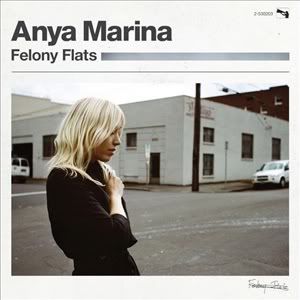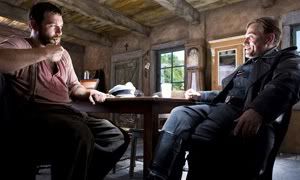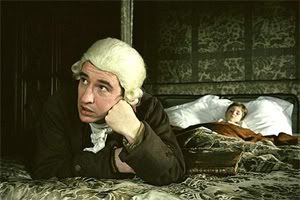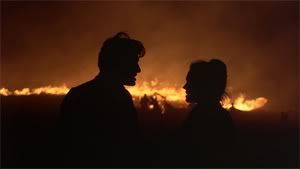On the surface, it's easy not to take Anya Marina seriously—the wispy voice, the bottle-blond hair, the coy album cover. And musically, what she's going for isn't terribly complicated. She makes broadly palatable music, borrowing a lot from various genres. A lot depends on the execution. Her approach is a template, and with enough depth and complexity, it can really work. On this—as on her previous albums—there are moments where she pulls it off. "Believe Me I Believe" is a solid example. Her voice drifts in and out of darkly textured electronic polyrhythms, and the contrast is superb. "Heart Stops" achieves the same effect, this time setting her against a lilting bassline and a wall of guitar. Despite very little actual structure, these spaces do give the listener plenty to explore. If she could carry it off for an additional half-hour or so, it would be one hell of an album. Unfortunately, she can't, and moments like this leave one wishing.
In the end, "borrow" is the right word for what Marina is doing. She doesn't immerse herself in any of these genres; she always seems like a visitor. She dips her toes in the acrid waters of punk, grunge, etc., but always there is the sheen of a top-40 star. This formula is exactly what's landed her on buzz-making commercial spots and soundtracks, of course. Such venues exist all around the edge of the mainstream, her home turf. Marina never gets lost in her wanderings; there's always a hook around the next corner. It's easy to listen to, for sure, but after a while it takes some effort just to stay engaged.
That said, and no backhanded compliment intended, maybe it's better not to try and stay engaged. For what it is, Felony Flats is close to pitch-perfect. Marina is alluring, more than fascinating. Her music exists comfortably in the background while you're doing something more interesting, calling your attention just often enough to add to the experience. But never enough to really captivate you.
Saturday, March 24, 2012
Anya Marina — Felony Flats (2012)
Saturday, March 17, 2012
Inglourious Basterds (2009)

I have to admit, I was ready to give up on Quentin Tarantino. I'm not a fan of capital-d Directors, by and large, because I think they tend to be self-indulgent and/or pretentious. Tarantino is certainly no exception, especially when it comes to indulgence. The last few films I've seen from him—Four Rooms, Jackie Brown, and certainly Kill Bill—have been more than I could take. I find myself watching them thinking, "Man, this guy is full of himself." Which can be a bit distracting if you're actually interested in, you know, watching the movie. So I wasn't even going to bother seeing Inglourious Basterds, but somehow I heard enough good things to end up putting it on my list. Before I sat down to watch it, though, I was prepared for it to be the last Tarantino film I ever bothered with.
I was pleasantly surprised. This film represents most of what I like about QT, and not much of what I don't. He has always had a wonderful way of drawing out a scene, pulling the suspense tight but not letting it break. The opening scene in the cabin was spectacular, and honestly that set me up to enjoy the film from the start. This particular talent is also where he can be a bit indulgent—the tediously long introduction of Eli Roth's otherwise insignificant character, for example. But for the most part, he keeps it well in check, and most of the suspense has a worthy payoff.
Tarantino's immense knowledge of film convention is another talent which can become an indulgence. He loves to make jokes that only film geeks will understand, and rarely do ten full minutes pass without an homage of some kind. Fair enough, as long as it doesn't intrude on the film. A few times here, though, he does manage to use that level of understanding to actually improve the story. Parallel plot lines that we expect to collide actually end up merging nicely. Characters are introduced and set up as important, only to be abruptly dispensed with. You end up with very little confidence as to who will survive to see the end of the film, and that's a good thing.
So yes, I enjoyed the film. It was well acted, well directed, and quite a bit of fun to watch. I wouldn't have minded seeing it on the big screen, actually, and next time around I might just give QT another chance. We'll see.
Saturday, March 3, 2012
Tristram Shandy: A Cock and Bull Story (2005)

With a movie like this, you either go along for the ride, or you don't. I did. When Steve Coogan teams up with Michael Winterbottom and Rob Brydon, I'm bound to. And while the humor with this group usually has a lot of ups & downs, I didn't ever feel bored during Tristram Shandy. Coogan plays himself playing himself quite well, and his self-deprecation is pitch-perfect.
All the meta levels of the film work quite well. It was particularly fun watching the adult Tristram Shandy introduce, and then critique, the actor playing his childhood self. I also appreciated the various transitions where people slip in and out of character, or where the crew step in and out. That was all handled really well, and made it a lot of fun. In the last half, though, as the film gets more and more tied to the off-screen stuff, it loses some of its vigor.
It was a fun film, but felt a bit slight. When it was all over, I had a lesser version of the same feeling I usually get from PoMo stuff, which is basically the resounding question "Why?" It's easier to find the purpose and meaning behind a Judd Apatow movie, I think, than behind so many of the ironically detached exercises that PostModernists love to love. Still, as I said, that reaction was muted with this movie. Mostly because I did find it so funny, and I think that is mostly down to Coogan's performance.
Labels:
2000s,
list of shame,
michael winterbottom,
movies,
review,
rob brydon,
steve coogan
Thursday, March 1, 2012
Days of Heaven (1978)

So, I've finally found a Malick film that I'm not wild about. There's plenty to like, and I can certainly see why a lot of people consider it a masterpiece. It's gorgeous, of course—almost every shot is a stunner—and yet that really doesn't detract from the story, which isn't always a given in auteur films. Other technical aspects of the film—the sound especially, and I don't just mean the music—are also quite impressive, and again serve the story well. So far, so good.
But then, there's the actual story. It's certainly pretty standoffish, as far as the emotion goes, but that's so obviously a conscious choice that I have to regard it as disciplined storytelling. The dryness of the telling was certainly in keeping with the film's locale, and the two feed back into each other pretty naturally. So I really didn't mind it. For the most part. I do think, though, that putting Richard Gere in this role was one of the worst casting choices I've ever seen. Especially at this age, Gere is completely incapable of a non-arrogant moment. It's not that he can't display, or even explore, other emotions—sadness, hopelessness, joy, love, envy, or playfulness, for example. It's just that in every one of those moments, his character also seems to be completely full of himself, assured of his own greatness. It doesn't serve this role well. Bill is a character with a lot of brashness, to be sure. It's his driving force, really. But he goes through several significant transformations in the course of the film, and during some of those transitional moments, his self-assuredness doesn't ring at all true. In those moments, the emotional tone of the film doesn't seem dry so much as shallow.
What bothered me much more, though, was the deep misogyny underlying the whole thing. On a second viewing, especially, I was struck by what a slight character Abby really is. If the whole film turns around her, and I think it does, that doesn't mean that she herself is actually important. Rarely does the film, or any one of its characters, ascribe her any real agency. Her fateful decision to go with The Farmer isn't even really her decision, as we're reminded several times. Bill pushes her into it, and she just goes where she's told. Neither does her relationship with The Farmer seem to have any real substance. In a way, she seems to exist simply as an object of desire for both men, and the central conflict of the film is actually just the overlapping of their desires. It's almost homoerotic, frankly. The two men are intimately connected, even though all they really share is a lover.
There's a lot to the film, and I'm certainly glad I watched it (both times). But I didn't come around to it, and I doubt I will try again.
Labels:
1970s,
brooke adams,
list of shame,
movies,
review,
richard gere,
sam shepard,
terrence malick
Subscribe to:
Posts (Atom)



